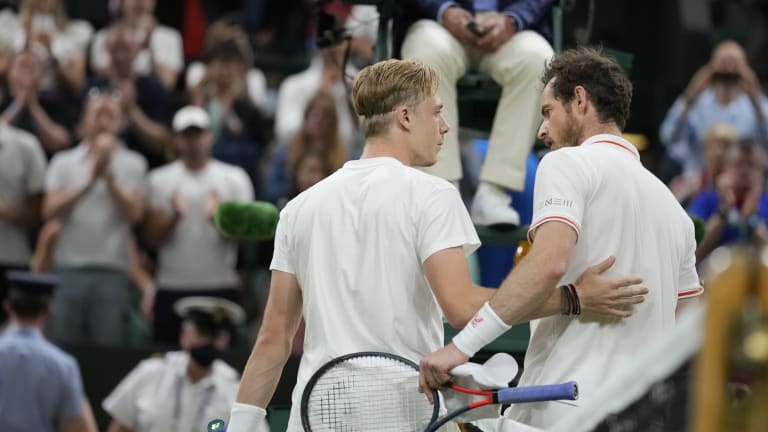But tonight, versus Shapovalov, trouble found Murray in all corners of the court, at nearly every stage of the match. On the first point, Murray took a fall. At 1-all, Shapovalov broke serve and was soon leading 5-1. Serving at 1-5, 15-30, Murray escaped, held and won the next two games, forcing his lefthanded opponent to serve for the first set at 5-4.
Murray’s first two wins–his first singles matches at Wimbledon in four years–had raised hopes that he had yet another great effort in him, something on the order of Jimmy Connors’ 1991 run to the semis of the US Open at the age of 39. For there it was, national hero at his most beloved venue, keen to excite the crowd as he had so many other times. That at least was the dream. The reality was Murray, at 34 having undergone a pair of hip surgeries, methodical in between points, far slower during them. Said Murray recently, “a lot of what I'm doing now is harder than a lot of the stuff I was doing when I was in my mid 20s in many ways, because, yeah, because of the physical issues that I have had and stuff.”
Shapovalov, at 22 in the full flush of his tennis youth, burns fuel like a fighter jet. Only five years ago, he’d earned the Wimbledon Junior title, the same year Murray had won the men’s singles for the second time. Said Shapovalov, “But as I have played these guys so many times now, that to me dealing with it the same way as any other match and I'm not focused on that it's Andy out there or any of the other top four guys. I'm just focusing on myself, like I said.”
Still, for Shapovalov to serve at 5-4, on Centre Court versus a player of Murray’s stature, was guaranteed to be difficult. Three times in that game, Murray held a break point. One was fought off with a wobbly but effective overhead. The other saw Murray whip a crosscourt backhand passing shot, only to have Shapovalov fend it off with a deft, short forehand that gently kissed the lawn. But perhaps the most telling was the first, Murray replying to a whipped down-the-line forehand drive with a meager forehand, lined into the net. Call it trouble in the form of feet, body and racquet, failing to generate enough energy to sustain the rally. Shapovalov’s first set point revealed a striking contrast: a laced crosscourt backhand drive that took Murray scampering off to the alley, followed up by a curled short slice backhand down the line that Murray did not reach in time.
As Winston Churchill had addressed Great Britain on a far more important occasion, “I have nothing to offer but blood, tears, toil and sweat.” Those were assets for Murray too. But in the face of Shapovalov’s counteroffer of movement, topspin, power, depth and serves, they meant little. “I expected the crowd to be for Andy,” said Shapovalov. “Obviously it's completely normal. For me, I tried to just focus on myself and play my game. You know, every point, I was just trying to compete the best I can, and I really felt like I was in every single point today.”
Following the second set, the roof was closed. Might that have aided Murray? No chance. “It's extremely frustrating, because, yeah, I feel like I put a lot of work into getting to this point, and then obviously to lose like that is tough,” said Murray. “Being as good as he is. I don't want to take anything away from his performance. He played really, really well. But, you know, if I'm going to put that much effort in, I want to be performing better than what I did here. Even though there were some great moments.”
Once Murray shook hands with Shapovalov, he gathered his equipment and prepared to leave the court. Here was a moment when I pined for tradition. Wimbledon this year is conducting post-match interviews with the victors; a first for The Championships, in line with what happens at other majors. But I’ve always loved how, on Court One and Centre Court, the players exit together, further recognition that tennis is not strictly about the winner, but the shared experience of competition, sport more mutual engagement than zero-sum. This was how I wanted to see Murray leave the court, joined by his fellow warrior – as young Andy and Jamie had so many times.
